"Nearly 50% of older adults report experiencing some form of sleep disorder, affecting not only their nights but also their quality of life overall."
Did you know that almost half of all older adults face significant sleep problems? Elderly sleep disorders are far more common—and challenging—than many realize. If you or your loved one struggles with falling asleep, staying asleep, or waking too early, you’re not alone. In this comprehensive guide, discover the causes behind sleep issues in seniors, proven strategies to achieve good sleep, and expert advice tailored for older people. Restful nights and brighter days can be yours with the right information and dedicated action.
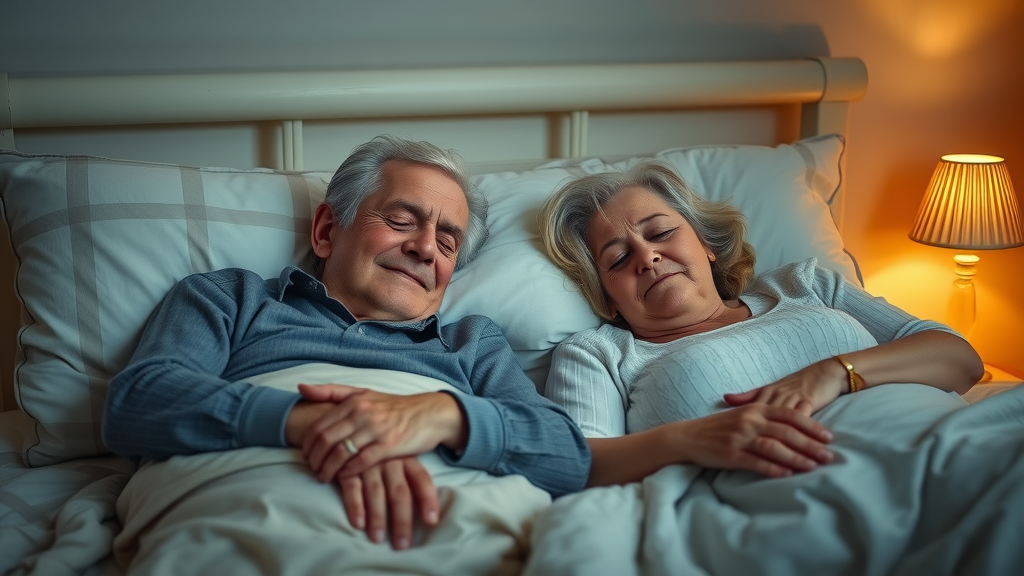
Understanding Elderly Sleep Disorders: Key Insights and Statistics
- Overview of Elderly Sleep Disorders: Sleep disorders among older adults continue to rise, with studies showing up to 48% of individuals over the age of 65 in the United States reporting regular sleep problems. These disorders go beyond the occasional restless night—they affect nearly every aspect of an older adult’s health and wellbeing.
- Health Impact: Sleep is a vital component of overall health. Poor sleep can lead to daytime sleepiness, cognitive decline, chronic medical conditions, and even a higher risk of falls for older adults. Addressing sleep issues directly can enhance emotional resilience, immune function, and promote healthy aging.
- Myths vs. Facts: A lingering myth suggests older adults need less sleep, but research shows most seniors still require seven to eight hours of quality sleep per night. Misconceptions like these can lead to neglect of underlying sleep disorders, so it’s critical to distinguish facts from fiction.
- Why Address Sleep Problems: Beyond mere comfort, resolving sleep problems is essential for maintaining independence, managing chronic illnesses, and securing better mental health outcomes among older adults.
By understanding the prevalence and impact of sleep disorders, caregivers and families can intervene early, tailoring strategies that improve sleep quality and overall life satisfaction for seniors.
How Sleep Changes in Older Adults: Exploring Age-Related Sleep Problems
As people age, the way they sleep shifts—often in ways that make restful nights more elusive. Normal aging leads to lighter sleep, reduced total sleep time, and more frequent nightly awakenings. For many older adults, such changes can be frustrating, leading to additional worries about health and wellbeing. Recognizing the difference between natural aging sleep patterns and disordered sleep is vital to proper care.
Sleep issues aren’t just a nuisance; persistent problems signal deeper physiological changes. Normal aging can bring about earlier bedtimes and morning awakenings, but conditions like chronic insomnia, sleep apnea, and restless legs syndrome cross the line from normal to concerning. Identifying when sleep issues become disruptive or chronic is the first step in restoring good sleep for older people.
Normal Sleep Changes Versus Elderly Sleep Disorders in Older Adults
- Difference between Normal Aging and Sleep Disorders: It's natural for older adults to notice changes in their sleep patterns, such as spending more time in lighter stages of sleep and experiencing more awakenings at night. However, when these changes cause chronic fatigue, mood shifts, or impact daytime functioning, a sleep disorder may be present.
- Early Warning Signs: Pay attention to daytime sleepiness, irritability, memory issues, and frequent trouble falling asleep. Chronic insomnia, persistent difficulties staying asleep, or loud snoring with gasping are clear warning signs that professional help is warranted.
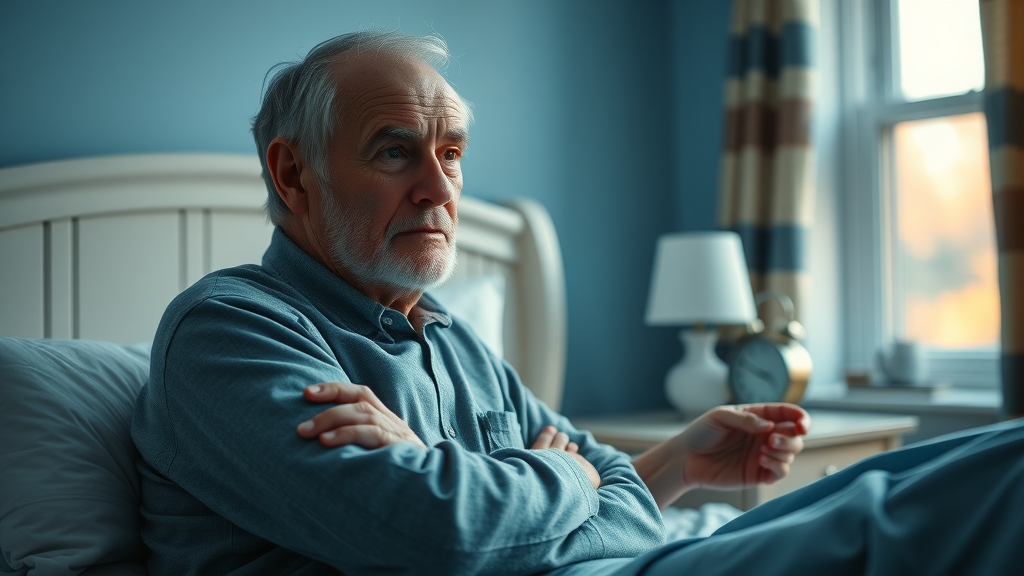
Role of Circadian Rhythm in Elderly Sleep Disorders
- Understanding Circadian Rhythm: The body’s internal clock, or circadian rhythm, regulates sleep-wake cycles. With age, this rhythm becomes less robust, making it harder for older adults to stay asleep through the night or fall asleep easily at bedtime. Reduced exposure to daylight and changes in routine can further disrupt this balance.
- Link to Poor Sleep: Disruptions in circadian rhythm contribute to fragmented sleep, increased early awakening, and reduced total sleep time. This connection underscores the importance of regular daily routines and light exposure as part of managing elderly sleep disorders.
Grasping the distinctions between natural aging and actual sleep disorders empowers older adults and caregivers to seek timely intervention and effective solutions.
Most Common Elderly Sleep Disorders Affecting Older Adults
Chronic Insomnia: Persistent Sleep Problems in Older Adults
- What Is Chronic Insomnia? Chronic insomnia is defined by prolonged difficulty falling asleep, staying asleep, or waking too early—occurring at least three nights a week for three months or more. Among older adults, chronic insomnia may be linked to stress, medical conditions, or medication side effects.
- Symptoms and Consequences: Older people with insomnia often report excessive daytime sleepiness, impaired memory, irritability, depression, and a decline in daily functionality. Over time, chronic sleep deprivation can exacerbate heart disease, high blood pressure, and even cognitive decline.
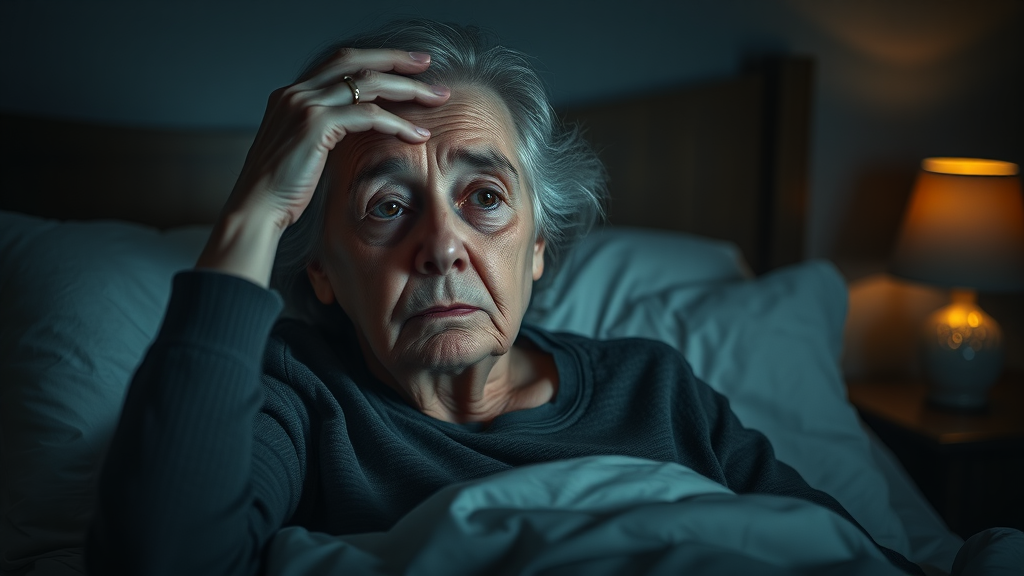
Obstructive Sleep Apnea: A Major Sleep Disorder in Older Adults
- What Is Obstructive Sleep Apnea? Obstructive sleep apnea (OSA) causes repeated pauses in breathing during sleep due to airway blockage. Symptoms include loud snoring, choking, gasping, morning headaches, and persistent fatigue despite adequate sleep time.
- Older Adults at Greater Risk: Age-related muscle relaxation and weight gain make older people more vulnerable to obstructive sleep apnea. Untreated OSA raises the risk for cardiovascular disease, metabolic issues, and excessive daytime sleepiness.
Other Sleep Problems: Periodic Limb Movements, REM Disorders, and Restless Legs
- Less Common Sleep Disorders: Beyond insomnia and sleep apnea, periodic limb movement disorder (PLMD), REM behavior disorder (acting out dreams), and restless legs syndrome disrupt sleep for many older adults.
- Recognizing Symptoms: Repetitive leg twitching, vivid nightmares, and irresistible urges to move limbs at night can be signs of these conditions. When left unaddressed, these sleep problems may lead to chronic insomnia and fragmented sleep patterns.
It’s critical to identify the specific type of sleep disorder at play to choose the best treatment path and restore restful nights.
Health Impacts: How Elderly Sleep Disorders Affect Older Adults’ Overall Health

- Chronic Disease Connection: Sleep disorders in older adults are closely associated with hypertension, diabetes, obesity, and immune dysfunction. Lack of restorative sleep increases the risk of falls, hospitalizations, and longer recovery from illness.
- Mental Health: Poor sleep is both a symptom and a trigger for depression, anxiety, and cognitive decline. Seniors struggling with consistent sleep problems often report increased emotional distress and a higher incidence of neurodegenerative diseases.
- Daily Life and Quality of Life: Sleep problems sap energy, diminish social involvement, and reduce the ability to perform daily tasks. Addressing these issues is fundamental for healthy longevity and preserving independence in older adults.
In light of these wide-reaching effects, medical professionals stress the importance of early intervention for elderly sleep disorders to avert further complications.
Risk Factors: Why Are Older Adults More Susceptible to Sleep Disorders?
- Biological Factors: Aging brings natural changes—diminished melatonin production, lighter sleep cycles, and more fragmented sleep patterns. These shifts increase vulnerability to both chronic insomnia and obstructive sleep apnea in the elderly.
- Medical, Psychological, and Lifestyle Contributors: Chronic illness, pain, urinary frequency, depression, and anxiety all worsen sleep. Poor sleep habits or irregular routines also contribute to the cycle of disrupted sleep.
- Medication Side Effects: Many common prescriptions can interfere with sleep, especially certain blood pressure drugs, antidepressants, and stimulants. Older people using multiple medications are at heightened risk for sleep problems resulting from drug interactions or side effects.
Awareness of these risk factors helps healthcare providers, older adults, and caregivers devise comprehensive strategies for long-term sleep health.
Recognizing the Symptoms: How to Identify Elderly Sleep Disorders
- Key Symptoms: Red flags include persistent difficulty falling asleep, waking up frequently, excessive daytime sleepiness, irritability, forgetfulness, and loud snoring. In older adults, any consistent change in sleep habits warrants close attention.
- When It’s Chronic: If sleep problems persist for several weeks and cause daytime impairment, it’s time to consider a formal assessment. Warning signs may manifest as confusion, mood swings, or an increased risk of falls.
- Self-Assessment Tools: Using sleep diaries and checklists helps track sleep patterns and pinpoint behaviors that may trigger sleep disorders. Noting frequency, duration, and impact of sleep disturbances equips health providers to make an accurate diagnosis.
"Sleep is not a luxury for older adults—it’s a necessity for physical, emotional, and cognitive health." - Geriatric Sleep Specialist
Early identification opens the door to evidence-based treatments that restore energy, mood, and cognitive function.
Diagnostic Approaches: How to Evaluate Sleep Disorders in Older Adults

- Self-Assessment vs. Professional Help: While over-the-counter sleep aids and self-assessment questionnaires abound, professional evaluation by a sleep medicine specialist is recommended for long-term or complex issues. These experts can rule out underlying conditions and suggest individualized care.
- Role of Diaries and Questionnaires: Keeping a sleep diary tracking time asleep, number of awakenings, and daytime symptoms gives detailed insight into sleep patterns. Standardized questionnaires, such as the Epworth Sleepiness Scale, help quantify the impact of sleep disorders.
- Clinical Tests: Polysomnography (overnight sleep study) and home sleep apnea tests provide objective data about brain activity, oxygen levels, and breathing patterns, and are particularly useful when sleep apnea or restless legs syndrome is suspected.
Accurate diagnosis forms the foundation for effective, targeted treatment that can transform sleep and quality of life for older adults.
Treatment Options: Managing Elderly Sleep Disorders Effectively
Non-Pharmacological Solutions for Sleep Problems in Older Adults
- Sleep Hygiene and Behavioral Strategies: Maintaining a regular sleep schedule, creating a quiet and dark environment, and limiting afternoon caffeine are effective ways to promote good sleep habits. Practicing relaxation before bed through reading, meditation, or gentle stretching is also beneficial.
- Cognitive Behavioral Therapy for Insomnia (CBT-I): CBT-I is the leading non-drug therapy for chronic insomnia—offering practical tools to manage negative thoughts around sleep and build healthy routines. Most older adults see significant improvement within several weeks of beginning CBT-I.

- Lifestyle Interventions: Consistent physical activity, a balanced diet, and exposure to morning sunlight support circadian rhythm and natural sleep-wake cycles for older people. Building a stable daily routine is key for those with chronic sleep problems.
Medical Treatments and Use of Sleeping Pills in Older Adults
- Prescription Medications: Sleeping pills or sleep med may be used when non-drug approaches prove insufficient, but only under physician supervision. Prescription sleep medicines can quickly relieve severe symptoms but should be used sparingly in older adults due to side effects.
- Risks and Side Effects: Older adults are more prone to medication side effects like confusion, falls, and dependence. Sleep medicine is best reserved for short-term crises, always with regular review by a healthcare provider.
Managing Sleep Apnea: CPAP, Oral Appliances, and Surgical Options
- CPAP and Related Treatments: Continuous positive airway pressure (CPAP) machines prevent airway collapse in obstructive sleep apnea, restoring healthy oxygen flow and deep sleep. Oral appliances and positional therapy are also useful alternatives for milder cases.
- Innovative Solutions: New devices and minimally invasive surgical procedures provide options for older adults who have persistent or complicated sleep disorders that don’t respond to standard therapies.
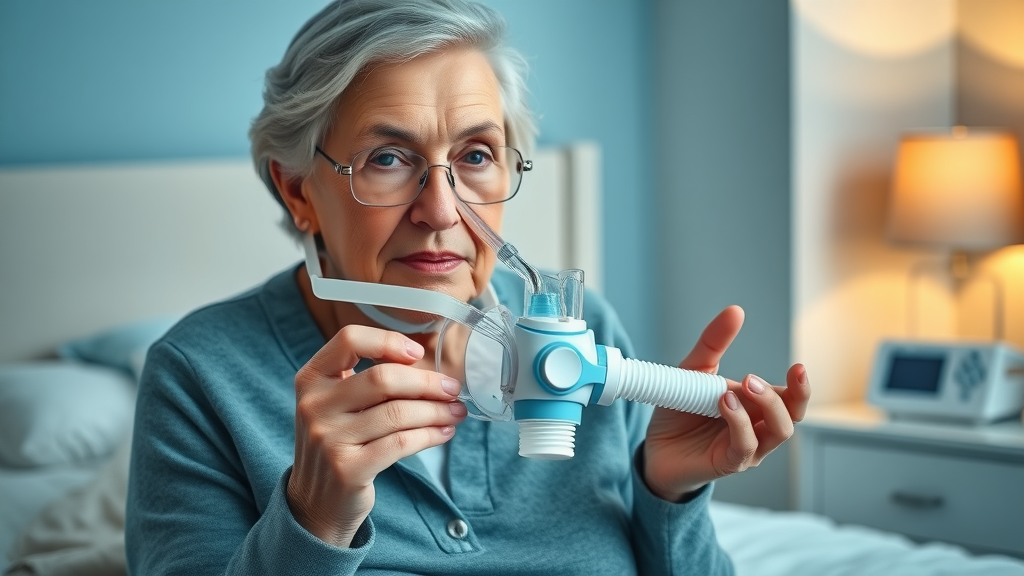
Working closely with a sleep medicine provider ensures that treatment matches the individual’s health profile and unique needs.
Daily Habits: Shaping Better Sleep for Older Adults
Optimizing Sleep Habits in Older Adults to Reduce Sleep Disorders
- Consistent Sleep Routines: Going to bed and waking up at the same time every day stabilizes the circadian rhythm and improves sleep quality in older people. Developing bedtime rituals—such as light reading, warm baths, or listening to calming music—signals the body it’s time for rest.
- Ideal Sleep Environment: A comfortable, dark, and quiet bedroom helps prevent unnecessary awakenings. Investing in supportive mattresses, blackout curtains, and soft lighting enhances total sleep time and minimizes poor sleep episodes.
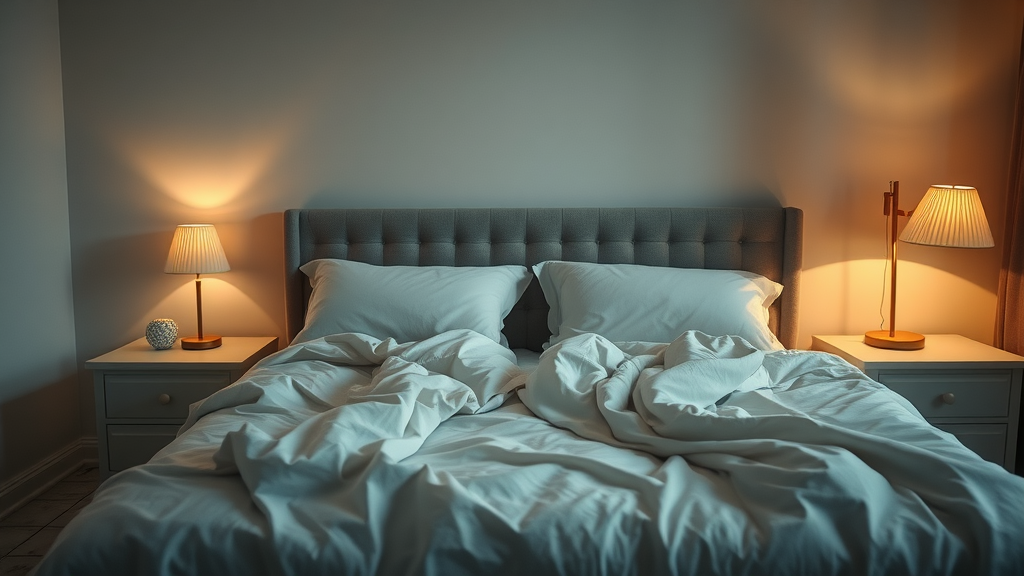
- Light Management and Stimulant Control: Exposure to natural light during the day promotes daytime alertness and nighttime drowsiness. Limiting screen time, large meals, alcohol, and caffeine in the hours before bed further reduces sleep problems.
Relaxation Techniques and Stress Management for Elderly Sleep Disorders
- Mindfulness and Meditation: Gentle exercise, deep breathing, yoga, and mindfulness practices reduce stress and help older adults fall asleep more readily. Relaxation before bed prepares both mind and body for a restorative night’s sleep.
| Sleep Disorder | Symptoms | Common Causes | Main Treatments |
|---|---|---|---|
| Chronic Insomnia | Difficulty falling asleep, frequent awakenings, early morning wake-up | Stress, anxiety, medical condition, medication side effect | CBT-I, sleep hygiene, lifestyle changes, short-term sleep med |
| Obstructive Sleep Apnea | Loud snoring, choking/gasping, excessive daytime sleepiness | Airway collapse, obesity, aging muscles, medical issues | CPAP, oral appliances, weight loss, positional therapy |
| Restless Legs Syndrome / PLMD | Urge to move legs, twitching at night, fragmented sleep | Neurological, iron deficiency, medications | Lifestyle modification, exercise, medication for severe cases |
Role of Caregivers and Family: Supporting Older Adults with Sleep Disorders
- Family Awareness: Informed family members can detect mood shifts, memory lapses, or new sleep problems in older adults earlier. Positive encouragement and involvement improve adherence to treatment plans and outcomes.
- Caregiver Checklists: Monitoring daily sleep time, quality, and changes in sleep pattern gives valuable information to healthcare providers. Red flags like confusion, frequent falls, or extreme fatigue should prompt urgent medical review.
- Caregiver Resources: Support groups, educational programs, and online resources empower caregivers to advocate effectively for their loved one's sleep health and wellbeing.

Support networks for both seniors and caregivers are essential for successful management of elderly sleep disorders.
Common Myths and Misconceptions about Elderly Sleep Disorders
- Myth: Older Adults Need Less Sleep. In reality, the amount of sleep required does not change dramatically with age. Most older adults need 7–8 hours, and chronic poor sleep often signals an underlying sleep disorder, not just age.
- Myth: Sleep Medications Are Always Safe for Seniors. Many believe prescription sleeping pills are a harmless fix, but these can cause memory issues, falls, and dependency. Non-pharmacological treatments are generally safer and just as effective over the long term.
Understanding the truth about sleep changes in aging aids families and seniors in seeking the right solutions for persistent sleep problems.
When to Seek Professional Help for Elderly Sleep Disorders
- Signs to Watch For: If sleep disorders disrupt daily life—causing mood swings, difficulty focusing, memory loss, or frequent accidents—it’s time for a professional evaluation. Don’t ignore sleep problems that last more than a month or worsen over time.
- Talking to Providers: Approach healthcare providers with a detailed sleep diary, documented symptoms, and questions about possible treatments. A collaborative approach ensures the most effective, safe management for older adults with complex health profiles.
Proactive communication is the cornerstone of positive outcomes in elderly sleep disorder treatment.
Research & Innovations: The Future of Elderly Sleep Disorder Treatment
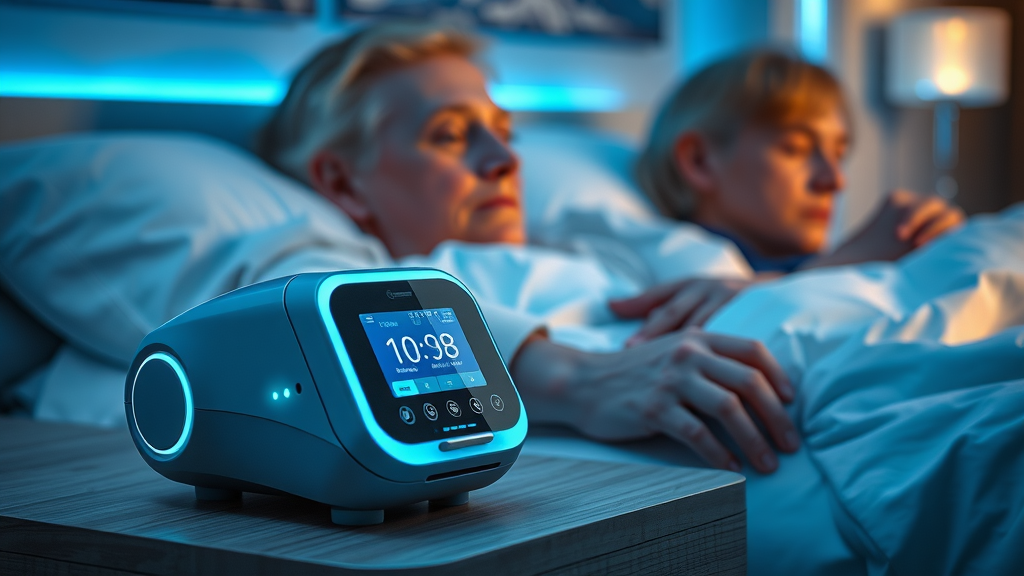
- Emerging Therapies: Exciting technology—from smart mattresses to wearable sleep trackers—offers older adults individualized sleep insights and can gently prompt behavior changes or alert caregivers to concerning trends.
- Clinical Trials and Research: Ongoing studies in sleep medicine, including non-invasive neuromodulation and circadian rhythm therapies, hold promise for improving and customizing elderly sleep disorder care in the coming years.
"Proper diagnosis and individualized treatment plans restore sleep—and vitality—to older adults with persistent sleep disorders."
Innovation in elderly sleep health continues to bring new hope for seniors facing persistent sleep problems.
Real Stories: How Older Adults Overcame Sleep Disorders
- Case Studies: Meet individuals who conquered chronic insomnia, embraced CPAP for sleep apnea, or overcame restless legs syndrome using tailored behavioral interventions and supportive care teams.

- Lessons and Tips: Success stories highlight the power of persistence, family involvement, and working closely with sleep medicine specialists. Many found that small changes in diet, exercise, and bedtime routines led to big improvements in sleep quality and life satisfaction.
Sharing these journeys inspires others to take the first steps toward reclaiming restful sleep.
Frequently Asked Questions on Elderly Sleep Disorders
-
What is the most common sleep disorder in the elderly?
The most common elderly sleep disorder is insomnia, presenting as trouble falling or staying asleep, early awakenings, or unrefreshing rest. Other common conditions include obstructive sleep apnea and restless legs syndrome.
-
What is the best treatment for insomnia in older adults?
The best treatment for insomnia in older adults is cognitive behavioral therapy for insomnia (CBT-I), often paired with improved sleep hygiene and consistent routines. Medication is reserved for cases unresponsive to these methods.
-
Why do seniors have a hard time sleeping?
Seniors often struggle with sleep due to changes in circadian rhythm, reduced melatonin, chronic health conditions, increased medications, and higher rates of anxiety or depression. These factors collectively reduce both quantity and quality of sleep.
-
What does it mean when an older person sleeps a lot?
Excessive sleeping in the elderly can signal sleep disorders, depression, side effects from medication, or underlying neurological conditions. Persistent changes in amount of sleep or sleep pattern should always be evaluated by a healthcare professional.
Key Recommendations and Takeaways for Managing Elderly Sleep Disorders
- Prioritize sleep: Actively address ongoing sleep problems and avoid unhealthy sleep habits.
- Holistic Care: Combine medical evaluation with behavioral modification and education.
- Empowerment: Educate and support both older adults and caregivers in managing sleep disorders.
- Stay Proactive: Schedule regular assessments for any evolving sleep issues or changes in health.
Take charge of sleep health to unlock better days and brighter nights for yourself or your loved one.
Discover More on Elderly Sleep Disorders: Resources and Support for Older Adults
- Visit sleep disorder associations and educational groups for expert guidance and the latest research.
- Explore recommended books, articles, and online courses created for older adults and caregivers.
- Join local or virtual support groups focused on improving sleep health for seniors and sharing success stories.
"The journey to peaceful nights begins with understanding, action, and ongoing support—empowering every older adult to reclaim restful sleep."
Expert Interview: A Sleep Specialist Explains How to Identify Elderly Sleep Disorders
Watch our expert video interview for in-depth explanations on evaluating sleep disorders in seniors and practical advice from leading sleep medicine specialists.
Patient Testimonial: Overcoming Obstructive Sleep Apnea and Regaining Quality Rest
Hear how real older adults have conquered sleep apnea and reclaimed full, rested lives in this inspiring patient story video.
 Add Element
Add Element  Add Row
Add Row 




Write A Comment